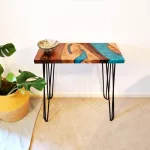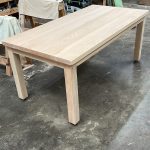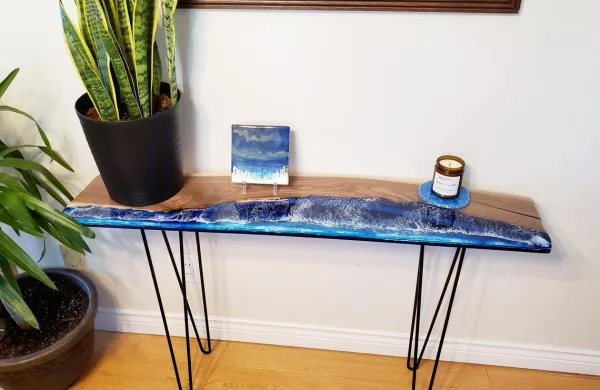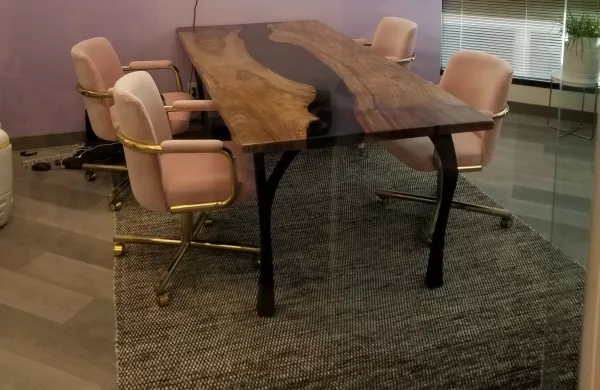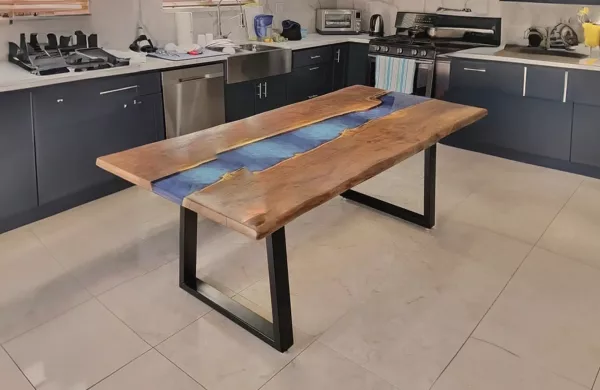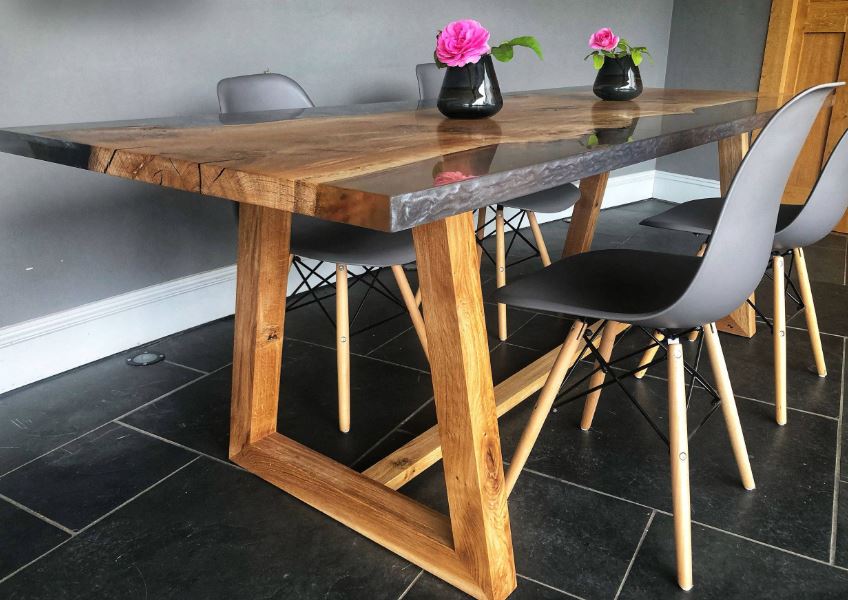
In the realm of modern home design, the choice of kitchen furniture is pivotal in defining the space’s aesthetics and functionality. Among the myriad options available, epoxy kitchen tables have emerged as a popular choice for their unique blend of style and durability. However, like any material, epoxy comes with its own set of advantages and disadvantages. Understanding these can help homeowners make an informed decision about whether an epoxy kitchen table is the right fit for their home. This comprehensive analysis aims to explore the various pros and cons of epoxy kitchen tables, delving into aspects such as durability, maintenance, cost, and aesthetic appeal, to provide a balanced viewpoint on this contemporary furniture choice.
- Durability and Longevity: One of the primary advantages of an epoxy kitchen table is its durability. Epoxy, a type of resin, when applied to a kitchen table, creates a hard, protective surface that is resistant to scratches, dents, and general wear and tear. This durability means that an epoxy table can withstand the rigors of daily use without showing signs of damage, making it ideal for busy households. Additionally, epoxy is resistant to moisture, which is a common issue in kitchens. This resistance to water prevents warping, cracking, and other damage that can be caused by spills and humidity.
- Unique Aesthetics: Epoxy tables offer a unique aesthetic appeal. Epoxy can be clear or tinted and can be used to encapsulate objects, colors, and textures within the tabletop. This allows for incredible customization – from embedding pictures and keepsakes to creating intricate designs with colored epoxy. The result is a one-of-a-kind piece of furniture that can be tailored to the specific style and decor of your kitchen.
- Easy to Clean and Maintain: The smooth, non-porous surface of an epoxy table makes it exceptionally easy to clean. Spills can be wiped away without staining, and the table can be kept hygienic with simple cleaning methods. This ease of maintenance is particularly advantageous in a kitchen setting where spills and messes are common.
- Heat Resistance: Epoxy resin has good heat resistance, which is beneficial for a kitchen environment where hot pots and pans might be placed on the surface. While it’s not advisable to place extremely hot items directly on the epoxy surface, it can generally withstand the heat better than many other materials.
- Eco-Friendly Options: For those concerned with environmental impact, there are eco-friendly epoxy resins available. These resins are made from more sustainable materials and have a lower environmental footprint, offering a greener option for eco-conscious homeowners.
- Versatility in Design: The versatility of epoxy allows it to be used on different types of bases and with various materials. Whether it’s wood, metal, or something more exotic, epoxy can enhance and protect the material, giving you a wide range of design options.
- Reflective and Bright: The glossy finish of epoxy can help to brighten a kitchen space by reflecting light. This can be particularly advantageous in smaller or darker kitchens, where additional light can make the space feel larger and more open.
- Chemical Resistance: Epoxy is resistant to many chemicals, making it an ideal choice for a kitchen table where exposure to various substances, from food acids to cleaning products, is common.
- Seamless Surface: Epoxy tables often have a seamless surface, which is not only visually appealing but also practical. There are no cracks or crevices where food particles and bacteria can accumulate, making for a more hygienic surface.
- Increases Property Value: A well-designed and unique epoxy kitchen table can be a focal point in your home, potentially increasing its overall aesthetic appeal and value.
- Repairability: Although durable, if an epoxy table does get damaged, it is often repairable. Scratches can be sanded out and the surface re-coated, restoring the table to its original condition.
- Cost-Effective in the Long Run: Given its durability and longevity, an epoxy kitchen table can be a cost-effective investment over the long term. Instead of replacing a table every few years due to wear and tear, an epoxy table can last for decades, making it a financially savvy choice for those looking to invest in long-lasting furniture.
- Customization for Specific Needs: Epoxy tables can be customized not just in appearance but also in functionality. Features like built-in charging stations, insets for utensils, or integrated cutting boards can be incorporated into the design, making the table more functional for specific kitchen needs.
- Allergen and Bacteria Resistant: The non-porous nature of epoxy makes it resistant to bacteria and allergens, which can be trapped in more porous table materials. This feature ensures a healthier environment in your kitchen, especially important for families with allergy sufferers.
- Compatibility with Various Interior Styles: Epoxy tables are incredibly versatile in style. They can be designed to fit into a modern, minimalist kitchen as easily as a more traditional or rustic one. The wide range of finishes and colors available in epoxy means it can be tailored to complement any interior design scheme.
- Ideal for Both Indoor and Outdoor Use: Some epoxy formulations are designed to be UV resistant, making them suitable for outdoor use as well. This versatility means that an epoxy kitchen table could also be used in an outdoor kitchen or dining area.
- Enhanced Color and Texture Possibilities: The use of epoxy can enhance the natural color and texture of the underlying material, such as wood, giving it a deeper, richer appearance. This enhancement brings out the beauty of the material in a way that other finishes might not.
- Sound Absorption Qualities: Epoxy can have some sound-absorbing qualities, which can help to reduce noise in a kitchen environment. This can create a more pleasant and calm atmosphere, especially in open-plan living spaces.
- Reflects Personal Style and Creativity: Because of the high level of customization possible with epoxy, a kitchen table can become a reflection of personal style and creativity. It’s a piece of functional art that can express individual tastes and interests.
- Enhanced Structural Integrity: When used in conjunction with materials like wood, epoxy can actually enhance the structural integrity of the table. It can fill in gaps and weaknesses in the underlying material, making the entire piece stronger and more stable.
- Supports Local Artisans and Craftsmen: Many epoxy tables are made by local artisans and craftsmen, providing an opportunity to support small businesses and independent artists. Purchasing an epoxy table can be a way to acquire a unique piece of furniture while also contributing to the local economy.
Cons of epoxy kitchen table
- Cost: Epoxy tables can be more expensive than traditional kitchen tables. The cost of materials and the labor-intensive process, especially for custom designs, can add up. This might be a significant consideration for budget-conscious buyers.
- Sensitivity to Heat: Despite being reasonably heat resistant, epoxy is not entirely heatproof. Placing very hot items directly on the surface can damage the finish or cause discoloration. This means extra care is needed when handling hot pots and pans.
- Potential for Yellowing: Over time and with exposure to UV light, clear epoxy can develop a yellow tint. This can be a drawback for tables placed in sunny areas or outdoors. UV-resistant epoxy is available, but it tends to be more expensive.
- Maintenance Requirements: Although epoxy tables are easy to clean, they do require regular maintenance to keep their shine and prevent scratching. The surface can be prone to smudges and fingerprints, requiring frequent wiping.
- Scratch Visibility: While epoxy is scratch-resistant, it is not scratch-proof. Scratches, when they do occur, can be more visible on the glossy surface, especially on darker or more transparent tables.
- Limited Repair Options: While minor damages to epoxy can be repaired, significant damages might be challenging or impossible to fix without professional help. This can be a concern for long-term durability and aesthetics.
- Weight: Epoxy-coated tables can be significantly heavier than other types of tables. This can make moving or rearranging furniture more difficult, and it might not be suitable for all floor types.
- Chemical Sensitivity: While epoxy is resistant to many chemicals, it can be damaged by others. Certain cleaners or spills (like acetone or strong acids) can harm the epoxy finish.
- Curing Time: The process of applying epoxy to a table requires curing time, during which the table cannot be used. This can be inconvenient if the table is a necessary part of daily life.
- Environmental Concerns: Traditional epoxy resins are made from petrochemicals and can release volatile organic compounds (VOCs) during the curing process. Although eco-friendly epoxies are available, they can be more expensive and less widely available.
- Potential for Bubbling and Imperfections: The process of applying epoxy requires skill and precision. Bubbles, dust particles, or other imperfections can get trapped in the finish, affecting the table’s appearance.
- Limited Resale Value: Because epoxy tables are often very customized, they might not appeal to everyone, potentially limiting their resale value compared to more traditional tables.
- Sensitivity to Sharp Objects: Sharp objects can scratch or even chip the epoxy surface if enough force is used. This requires users to be cautious with knives or other sharp utensils.
- Size and Shape Limitations: The process of applying epoxy might limit the size and shape of the table. Large or uniquely shaped tables may be more challenging and expensive to coat with epoxy.
- Inconsistency in DIY Projects: For those attempting to create or coat an epoxy table themselves, achieving a professional, even finish can be challenging. DIY projects can result in inconsistencies and imperfections.
- Allergies and Sensitivities: Some people might be allergic or sensitive to the components of epoxy resin, which can be a concern during the application process.
In conclusion, epoxy kitchen tables offer a unique combination of durability, aesthetic versatility, and modern appeal, making them a compelling choice for many homeowners. They stand out for their robustness, customizability, and ability to transform a kitchen space into a vibrant and functional area. However, considerations such as cost, sensitivity to heat and chemicals, and potential maintenance challenges should not be overlooked. Ultimately, the decision to opt for an epoxy kitchen table should be based on a careful assessment of these pros and cons in relation to individual needs, preferences, and lifestyle. By weighing these factors, homeowners can make a choice that not only enhances the beauty of their kitchen but also aligns with their practical requirements and long-term expectations.




